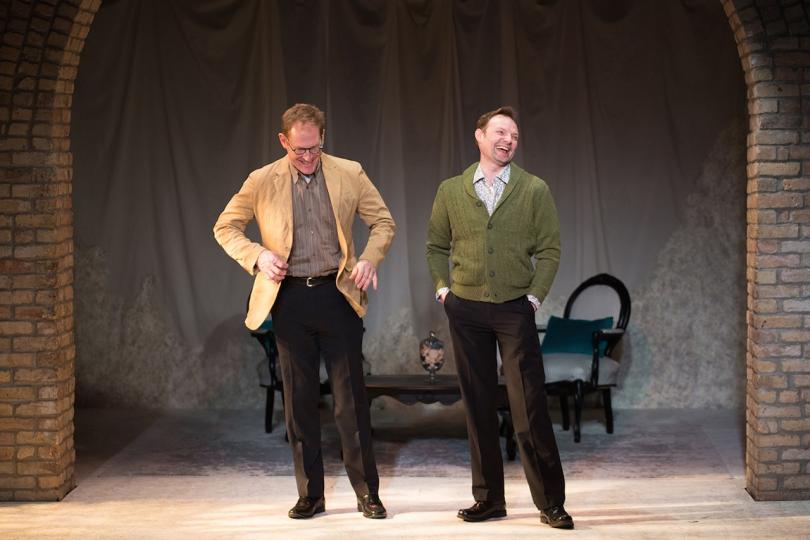The Best Banter

Loudmouth Collective’s The Best Brothers is a feast of adjectives, a show that generates its laughs and emotional connections largely via perfect phrasing. It’s not the kind of show to which you’d want to bring your friend who scoffs at theater as elitist entertainment for snobs, in other words. For those who take their language strong and sonorous, though, this is a real winner.
I’m sometimes leery of shows lauded for their use of language. Too often that means a play in love with the sound of its own voice, or one in which every character sounds conspicuously like the playwright. There are writers who can get away with that, but your Oscar Wildes are few and far between. Fortunately, The Best Brothers falls on the right side of language, packed – but not overstuffed - with bon mots, sardonic characterizations and incisive word choices that actually resemble things genuine humans might say. It’s the type of play that can pause the narrative to debate the subtle nuances of calling an acquaintance “Chuck” vs. “Charles” without coming off precious.
The titular brothers, Hamilton and Kyle, are a pair of well-to-do middle-agers caught off guard by the accidental death of their free-spirited mother. Much of the play focuses on their breathless, bickersome preparations for the funeral: winnowing down an invitation list, jockeying for the eulogy, deciding who gets the personalized thank-you cards. Any show this wordy runs the risk of becoming static, especially one with only two actors and three characters. Director Natalie Novacek keeps The Best Brothers surprisingly kinetic, manifesting David Mann and Wade A. Vaughan’s tense energy in nervous gestures, paper shuffling, smartphone check-ins and one big, cathartic burst of physical comedy.
Expansiveness through intimacy
It’s a production well-suited to the Open Eye space. The small stage and intimate seating arrangement that allows audiences to soak up the nuances of the theater’s frequent puppet performances also provide a perfect showcase for tracking all of Mann and Vaughan’s meaningful movements, sidelong glances and facial expressions in a play that makes excellent use of them.
Even though much of the production is two guys sitting in a room talking, the play feels more expansive than that. Some scenes give the brothers an unseen audience to address – receiving visitors at the funeral, greeting familiar faces at the park, scolding an unruly dog – but even when it’s just the two of them, their conversation pulls in people from all corners of their complicated pasts. For a sparsely populated play, it’s rich in personalities. The hirsute suitors, part-time sex workers, Peruvian mystics and other oddballs who peek in from the periphery make this a lived-in, innately relatable experience.
The mother lives in the sons
In what’s probably the play’s boldest stylistic choice, the recently deceased matriarch is not just relegated to her sons’ remembrances and resentments. She gets a chance to present her own side of the story, as Mann and Vaughan take turns donning her elegant gloves and delivering monologues about her adventurous existence and somewhat passive approach to motherhood. It’s an intriguing decision to have the mother played by two male actors. Even though her words are her own, our perception of the actors as her two very different sons colors her anecdotes and forces the audience to consider how many multitudes each of us contains. It’s a clever illustration of not just how a mother has shaped each of her sons, but vice versa.
Still, for all of its universal themes of sibling rivalries and parental approval, this is a play about two wealthy, profoundly white, middle-aged male urban professionals – one affected and slightly spacey, the other pompous and blustery – and their distant, dilettantish mother, all searching for happiness in a life of considerable privilege. An uncharitable observer might write it off as Frasier: The Play. While there may be some truth to that take, The Best Brothers largely avoids the “white people problems” trap by keeping its observations broad and its situations specific. Unlike, say, last year’s equally WASPy Guthrie mounting of The Cocktail Hour, this production builds characters strong and identifiable enough that we can sympathize with their experiences whether or not we share them. I don’t know that I’d want to spend too many evenings with these folks in real life, but they’re highly entertaining company for an hour-and-a-half of theater time.




